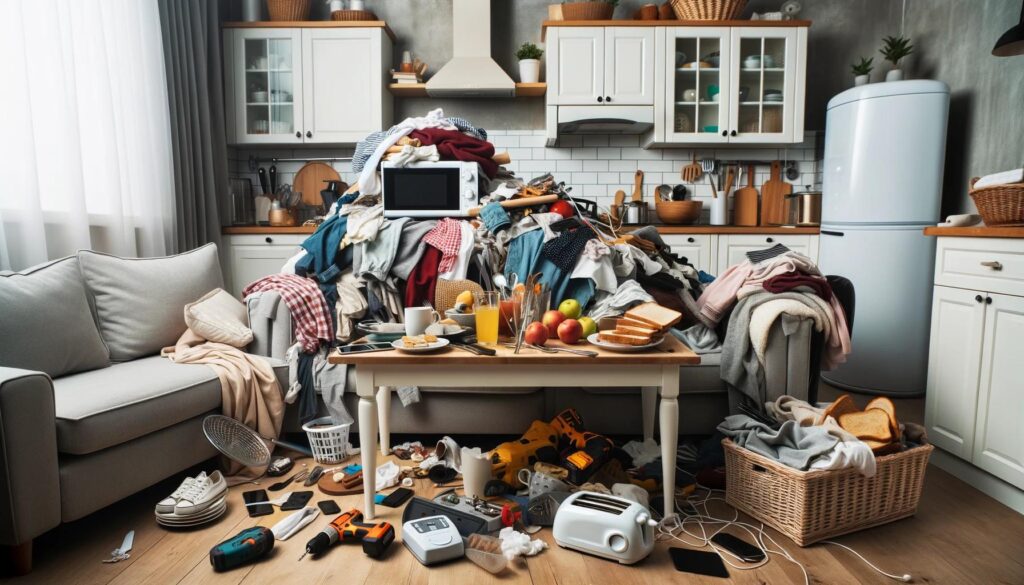We’ve all been there – looking at the piles of stuff in our closets, drawers, and rooms and wondering how our space got so cluttered. As much as we try to organize and minimize, the clutter keeps creeping back in.
But living simply doesn’t have to be so complicated.
In this guide, we’ll walk through practical tips for assessing your belongings, developing new habits, and embracing a better mindset in your decluttering journey.
You’ll learn strategies for letting go of what no longer serves you, organizing what remains, and maintaining a decluttered home that feels calming and intentional.
With a little effort, you can gain control over your possessions and create space for what truly matters.
Join us as we demystify clutter and simplify life!
What Exactly Is Clutter?
We all accumulate stuff over time, but when does it cross the line into clutter?
For our purposes, clutter is the excess of items that create distraction, stress, and disorganization in your home. Clutter is anything that prevents your living space from being clean, calm, and functional.
Clutter comes in many forms: piles of paper, overflowing closets, boxes of random belongings, knickknacks scattered about. While a little clutter may seem harmless, too much of it negatively impacts your mood and productivity. Living in clutter also makes it hard to find what you need and can be an embarrassment when guests come over.
The good news is, clutter is a problem you can solve. The first step is identifying the clutter in your home. Go room by room and determine what belongs and what doesn’t. Ask yourself questions like:
- Do I need this?
- Do I love this?
- When did I last use this?
- Does this add value or just take up space?
Be ruthless in your evaluations. If something does not spark joy or serve a purpose, add it to the donation or trash pile. decluttering and simplifying your space.
Living with less clutter will make your home more peaceful, organized, and functional. Now isn’t that worth clearing out some of the excess stuff?
The Different Types of Clutter
We define three main types of clutter: physical, digital, and emotional. Let’s break them down.
Physical clutter refers to the excess stuff in our homes and workspaces that creates disorder and distraction. This could be piled up papers, overflowing closets, junk drawers, etc. To minimize physical clutter, regularly declutter and organize your space. Get rid of anything you do not need or use.

Digital clutter refers to having too many apps, notifications, open browser tabs, unread emails, and disorganized files on our devices. This clutter distracts us and reduces productivity. To reduce digital clutter, unsubscribe from email lists, turn off notifications for non-essential apps, file and delete what you do not need.

Emotional and mental clutter refers to excessive worry, stress, negativity, and unhealthy thought patterns that clutter our minds and impact our wellbeing. Some ways to declutter your mind include practicing mindfulness, limiting exposure to negative media, spending time in nature, exercising, and nurturing your relationships.
By identifying the types of clutter in your life and taking action to minimize them, you’ll feel more at peace and able to focus on what really matters to you. Decluttering is a journey, so start small and build up from there.
Together, we can work to simplify our lives and embrace what’s truly essential.
Why Clutter Happens?
Many of us struggle with clutter in our homes for a variety of reasons. We find that there are some underlying causes that contribute to clutter building up over time.
First, we often form emotional attachments to our belongings. We associate items with memories or certain people in our lives, so we have a hard time parting with them even if we no longer use them.
The fear of waste or regret also causes us to hold onto things “just in case” we might need them someday – even though the stats on clutter says we probably won’t
Our busy lifestyles also promote clutter. We live in a consumer culture where we are constantly buying and accumulating more stuff. Without good organization skills or habits, all this stuff starts to pile up into cluttered messes.
We also tend to postpone making decisions about our belongings, so we put off decluttering and organizing. This procrastination leads to clutter accumulation.
Clutter often stems from our reluctance to discard items for emotional reasons and lifestyle factors like lack of time, excessive consumption, poor organization, and procrastination.
Recognizing the underlying causes of your clutter is the first step to gaining control over it. Once you understand why it happens, you can implement strategies to prevent clutter from building up in the first place.
Demystifying the reasons behind your clutter will help motivate you to pare down and organize your belongings.
The Downsides of Living With Clutter
When we live surrounded by clutter, it can take a major toll on our well-being. Here are some of the main downsides we’ve experienced:
Mental health suffers. Excess stuff causes anxiety, stress, and feelings of being overwhelmed for us. When our homes are chaotic and disorganized, our minds frequently feel the same way. Keeping clutter at bay helps us feel more at peace and focused.
Physical space becomes unusable. Clutter makes it difficult to use rooms for their intended purpose. A cluttered office means no space to work, a cluttered kitchen means limited ability to cook meals. We end up not using parts of our home which is a waste of space.
Safety risks increase. Clutter poses dangers like tripping hazards, difficulty evacuating in an emergency, and even fire risks. It’s important for our safety and security to declutter and organize.
Relationships and daily life are impacted. Excess clutter makes it hard to invite people over and can be embarrassing. It also makes simple tasks like getting ready in the morning or doing household chores time-consuming and frustrating. We’ve found that decluttering helps streamline our daily routines and improves our connections with others.
Overall, clutter has significant downsides that affect us mentally, physically and socially. Working to declutter and simplify our lives, even in small ways, can have big benefits for our well-being and daily functioning.
Using an app like Wavu helps make decluttering more accessible by giving us access to items without needing to buy more stuff. The less clutter in our spaces, the more we’re able to focus on what really matters to us.
Tips for Decluttering Your Home
Here are some of our top tips to get you started:
Start small and work your way up.
Don’t feel overwhelmed by tackling your whole house at once. Focus on one area or one drawer at a time. Once you’ve decluttered a space, you’ll gain momentum to keep going. Even easier, use a declutter checklist to help you during this process.
Get ruthless.
Be willing to let go of things you do not love or do not use. Ask yourself if each item sparks joy or is useful. If not, thank it for its service and donate or recycle it.
Bins are your friends.
Have bins or boxes on hand to make decluttering easier. Label them “donate,” “recycle,” “keep,” and “trash.” As you sort through items, place them in the appropriate bins. This makes the process more efficient and helps avoid decision fatigue.
Take photos of sentimental items.
For items you want to keep just for the memories, take photos of them and then feel free to donate the physical items. The photos will allow you to keep the memories without the clutter.
Borrow instead of buying.
Use an app like Wavu to borrow useful items instead of buying everything yourself. This can cut down on clutter and encourage a sharing economy in your community.
Maintain your space.
Once decluttered, do regular sweeps of your home to avoid buildup again. A little bit of maintenance goes a long way. Get in the habit of putting things back in their place and do another round of decluttering every few months.
Keeping our homes decluttered and simplified is an ongoing process. But with these helpful tips, you’ll be well on your way to embracing a minimalist lifestyle and finding more peace and calm in your personal space. Let the decluttering begin!
Maintaining a Clutter-Free Home
To keep clutter at bay in your home, you’ll need to make decluttering a habit. My wife and I have found that consistent maintenance and regular check-ins help us stay on track. Here are a few tips we’ve picked up along the way:
Do quick scans of each room.
Walk through each room in your home and do a quick once-over, eyeing any clutter that has built up. Make a note of any areas that need attention so you can declutter them right away. These mini-scans help you stay ahead of the clutter curve.
Tackle clutter categorically.
Focus your decluttering efforts on one area or category of items at a time. Maybe start with paper clutter one week, then move on to laundry and linens the next. Breaking things down into bite-sized chunks will make the whole process feel much more manageable.
Purge as you go.
Get in the habit of decluttering a little bit each day as you go about your routine. Throw out junk mail as soon as you bring it in. Put things back in their place after you’re done using them. Doing a little bit of purging each day means you won’t have as much clutter build-up to deal with on the weekends.
Designate a place for everything.
Give every item in your home a designated spot. When you bring something new into your space, determine where it will live right away. Having a spot for all your belongings makes it much easier to put things away and avoid clutter accumulation.
Maintaining a clutter-free home requires consistency and persistence, but with regular check-ins and small habit changes, you absolutely can achieve a minimalist space. The benefits to your physical and mental wellbeing will make all the effort worthwhile.
Now what?
Ultimately, living simply isn’t about depriving ourselves or conforming to arbitrary rules. It’s about taking control of our surroundings, identifying what’s important, and creating space for those things to thrive.
With some thoughtful evaluation and a dash of creativity, anyone can cut through the clutter and prioritize peace.
We don’t have to become minimalist monks to benefit from its principles. Start small, focus on progress over perfection, and simplify one space or habit at a time.
Clutter accumulates slowly, and it can be conquered slowly too. Just keep things simple.